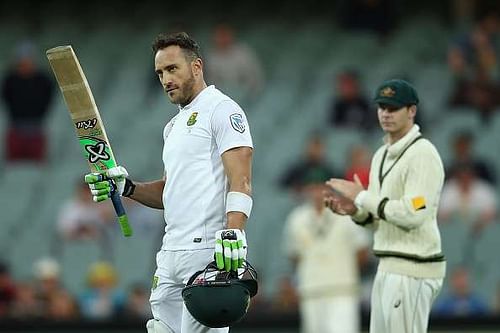
Captains and their day-one declarations

As the third Test between Australia and South Africa began at Adelaide today, there was a sense of anticipation in the air. The ‘mint-gate’ kept everybody engaged in the period leading up to the third Test and once the Du Plessis hearing concluded, the focus shifted to the pink-ball Test.
Du Plessis won the toss and opted to bat. Soon enough, at 44/3, he walked out to bat amidst jeers and boos from the partisan crowd. The situation took a turn for the worse in the 43rd over as T Bavuma was dismissed and the Proteas were 117/5.
From that stage on, Du Plessis took charge. Like a man on a mission, he laboured on and waged a lone battle as wickets fell around him. His single-handed effort took his side to 259.
With only a few overs left in the day’s play and Tabraiz Shamsi striking well at the other end, a string of big hits were expected by the skipper and his debutant partner. Instead, Du Plessis chose to declare at 259/9 after 76 overs. This meant that Australia had to play out 14 uncomfortable overs to see out the day.
If playing the final overs of a day is hard enough, add the pink ball, the lights and the twilight into the mix and the situation brews bucket loads of discomfort for the batsmen. Du Plessis looked to exploit this as he stepped out with his bowlers.
However, Australian openers Matt Renshaw and Usman Khawaja fended off the 14 overs hurled at them.
The surprise declaration, however, got the statisticians going. Have captains declared in the first innings of a Test match on day one before?
We dug through the archives to fish out a few instances where this has in fact occurred.
England vs New Zealand at Lord’s in June, 1949
England’s George Mann won the toss and opted to bat first. This was the era when time decided the end of day’s play and not the numbers of overs, 90 being the case now. After 103.1 overs and the clock showing a few minutes past 6pm, Mann declared the England innings at 313/9. New Zealand then stepped out and batted for 15 minutes to score 20/0 to bring an end to the first day’s play.
New Zealand concluded their first innings on 484 and England duly piled on 306/5 in their second essay. With this test being played over a 3 day period, the only possible outcome was a draw.
Pakistan vs England at Lord’s in August, 1974
Intikhab Alam won the toss for Pakistan and opted to bat first. At 51/0, the heavens opened up and play was called off. When play eventually resumed five hours later, left-arm spinner Derek Underwood ran riot and claimed 5/20. With Pakistan tottering at 130/9, Alam decided to declare.
England stepped out to bat and finished day 1 on 42/1. In response to England’s first-inning score of 270, Pakistan finished day 3 on 173/3. The next day, rains continued to pound the field. Underwood continued to wreak havoc when play resumed by taking 8/51 as the tourists were bowled out for 226, leaving England 87 to win. Justice prevailed however as the last day was washed out due to rain again leading to the Test ending in a draw.
India vs Australia at Hyderabad in March 2013
Michael Clarke won the toss and decided to bat first in the 2nd Test of the 2013 Border-Gavaskar Trophy. But his decision backfired as the tourists lost wickets in a heap. The first collapse was 63 for four and the second was a five for 28 towards the end of the innings.
With three overs possible before the end of day’s play, Clarke made a bold declaration at 237/9. In response, Cheteshwar Pujara and Murali Vijay put on a mammoth 370 runs to bury Australia. Clarke and company never recovered from the first innings deficit of 266 and were bundled out for 131 in their second innings to hand India a win by an innings and 135 runs.
Also read: Stephen Cook makes strange history at Adelaide Oval